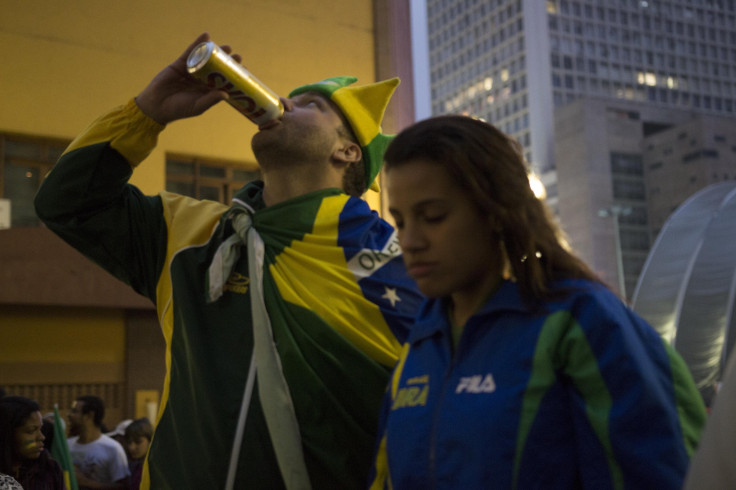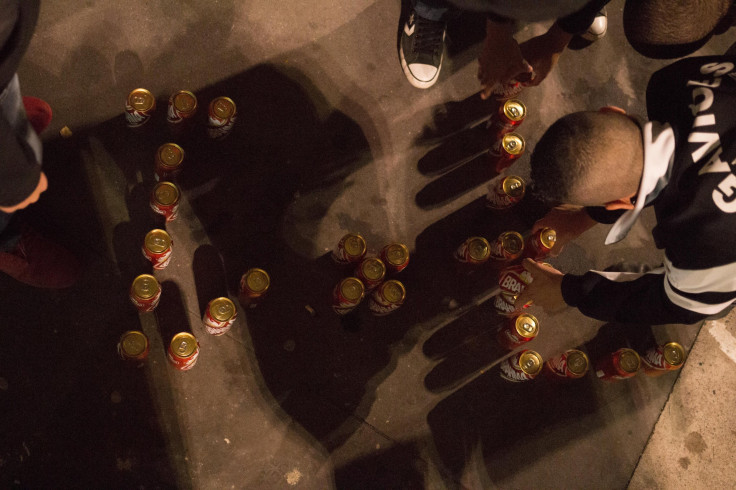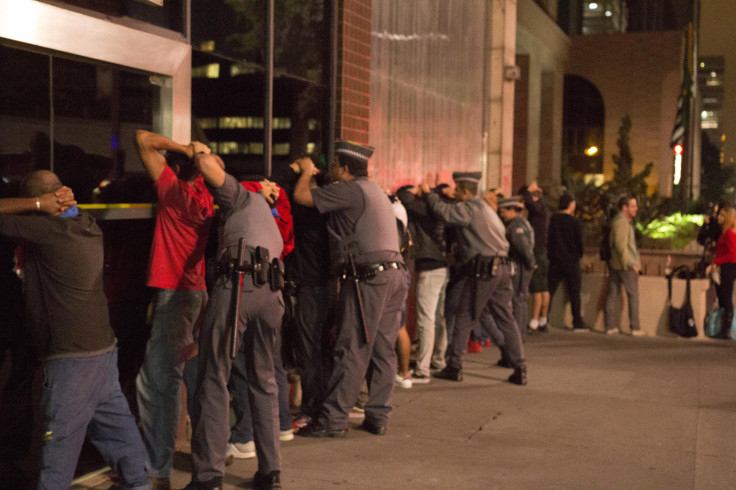After Brazil's World Cup Loss, Fans Lick Their Wounds, Try To Find Someone To Blame

SÃO PAULO, Brazil – The random buses smoldering in outlying neighborhoods were themselves sad symbols: Even Brazil’s outrage over its soccer team’s ineptitude was a bit flaccid.
Despite predictions of mass violence if Brazil lost its match against Germany, the mood of the country was more dreary and glum. Most fans went home after (or, in some cases, in the middle of) Tuesday's match, with only a few sporadic acts of vandalism and robbery and occasional displays of discontent in the streets. Most notable were a rash of pick-pocketing at FIFA FanFests in São Paulo and Rio de Janeiro and purse and jewelry-snatching on Rio’s Copacabana beach that triggered a small stampede caught on video.
Some acts of aggression were more symbolic. At halftime, when Brazil was already down 5-0, fans in Fortaleza chanted insults to President Dilma Rousseff. After the loss, disgruntled fans burned a Brazilian flag in São Paulo’s Vila Madalena neighborhood, which was documented in a photo released by Veja. With elections just three months away, and large political fortunes gambled on the Cup, the World Cup's national embarrassment is expected to have political repercussions: Someone will have to pay for such massive disappointment, and most expect it to be Rousseff and her Worker’s Party.
“Because soccer is a national issue, the result -- positive or negative -- spills into politics. Insatisfaction with the Cup stains the government’s image,” Jorge Barreto, a public administrator from Bahia, who spoke with International Business Times as he was strolling down Paulista Avenue, said. Barreto blamed the loss on Luiz Felipe Scolari, Brazil’s team manager -- not the government, though he said it was in keeping with the public's general sense of dissatisfaction with the direction their country is going.
“The game was a real let-down,” he said. “Everyone hoped that Brazil would play at Germany’s level and they didn’t ... they barely counted as a team. And that reflects the violation of what we expected, that a Cup played at home would allow Brazil to get to the final and even become champion [for the sixth time].”
Following the loss, Brazilians projected a range of negative emotions -- outrage, shame, emptiness. Today’s edition of the newspaper Folha included a half-page picture of the stadium with the lights off, looking dark and cold with only the scoreboard illuminated. Photos of gloom filled newspaper stands, including images of Brazilian players crying, with headlines such as “Humiliated at Home” and “The Worst Defeat in History.”
“People are really sad, and really angry,” Zilga Lima dos Reis, 53, a worker at a newsstand on São Paulo’s Paulista Avenue, said. “It's so sad that Brazil’s leaving the World Cup. I was really disappointed. The team played like warriors, but [Neymar and Thiago] were out, so there wasn't much we could do.”
Pundits predicted that Brazil’s disillusion will reverse Rousseff's recent gains in the polls. On July 1, a poll by Datafolha showed her up four points since before the Cup’s opening, leading her closest rival, Aécio Neves, by 18 percentage points. “Until now, Dilma surfed the wave of a World Cup where everything stayed in bounds,” Folha’s Natuza Nery Valdo Cruz wrote. “Brazil, good or bad, advanced. Dilma attacked ‘pessimists’ and ‘vultures,’ putting critics of the World Cup and low expectations for the Seleção in the same basket.”
With her team out of the World Cup, Rousseff can’t conflate patriotism with fandom. For her harshest critics, the Seleção’s loss was a victory.
“I haven’t watched a single game during the World Cup,” said Luiz Bantas, who felt more inclined to protest than to party, and had gathered with a small group of 15-20 anti-Cup protesters who also welcomed the end of Brazil’s 2014 World Cup run. They arranged beer cans on the ground in the shape of “7 x 1,” the final score of the Germany/Brazil game.

On Paulista Avenue, in a square normally filled with kissing teenagers and jamming musicians, 50 “shock troops” -- riot police -- waited in armored transport vehicles, bracing for confrontations with protesters. Fifteen more patrolled on horseback. After a protest three weeks ago that ended in massive property destruction, São Paulo’s military police have tried to overwhelm protesters with pre-emptive police presence, often outnumbering protesters two or three to one.
“Patriots are idiots,” the protesters chanted in a circle, turning occasionally to shout their lyrics at traffic and passersby. “The circus is over.” None wore the yellow jersey of Brazil, though some sported symbols of their local teams, like the white eagle of Corinthians, the team that will use Itaquera stadium after the Cup is finished.
Military police intervened pre-emptively, lining up the young chanters against a wall, systematically patting down and searching them, then recording their IDs. No cause for the search was given at the scene. A few minutes later, the crowd dispersed, and Paulista Avenue was quiet aside from the chattering of a half-full bar and the sound of horses’ hooves as mounted police returned their steeds to their gray trailers.

Even Vila Madalena, an unofficial World Cup party spot, was closed down by the military police after fights broke out between Argentine and Brazilian fans, according to reporting by Folha.
Starting about one hour before the detentions, an unconnected series of bus burnings began in various suburbs of São Paulo. At least five separate incidents of arson were reported between 6 p.m. and 8 p.m. local time, according to Globo. Nineteen buses were destroyed and one more heavily damaged in a single arson attack, according to Folha, though the final number could be higher. The outlet also reported that buses were burned in the city of Curitiba, in the neighboring state of Paraná.
“It’s really glum,” Edilon Santos, 40, a doorman from the south side of São Paulo, said. “Argentina can’t win, not in our house. I want Holland to win [or] Germany -- anyone but Argentina.” On the street behind him, Argentine fans marched up the streets, wearing their signature white and baby-blue, some with gaudy wigs, others with flags used as capes.
Despite the devastating loss, Brazilians quickly turned to their second favorite cheering pastime, railing against their rivals. In this case, it was Argentina, which plays Wednesday against the Netherlands.
Gesturing toward a newsstand, Lima dos Reis observed, “It’s all about the next Cup, now [in 2018]. Except that Argentina can’t win, because they are our rivals. ”
© Copyright IBTimes 2025. All rights reserved.
Join the Discussion





















